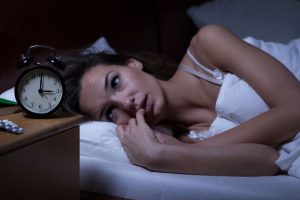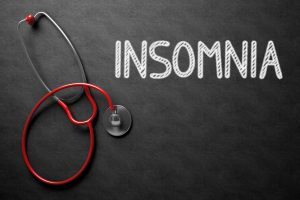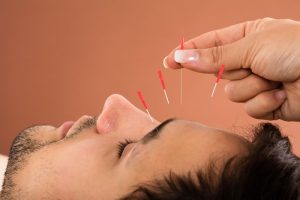Treating Insomnia
Acupuncture for Insomnia
There are three main keys to optimum health: a proper diet, regular exercise, and quality sleep. When we fail to get that sleep, many of us turn to chemical sleep aids, endangering our health and offering, at best, a short-term solution to the problem.
In this post, I explain the dangers of insomnia and short sleep, the ways Western medicine fails to treat the issue, and why acupuncture may be a more effective means of treating sleep disorders.
Insomnia and Short Sleep: How Do They Affect Your Health?
According to the Centers for Disease Control (CDC), adults need at least 7 hours of sleep every night. Across the country, though,  around one-third of Americans fail to meet that standard. Approximately the same number report experiencing insomnia at some point during the year, with between 10 and 15 percent of adults reporting chronic insomnia.
around one-third of Americans fail to meet that standard. Approximately the same number report experiencing insomnia at some point during the year, with between 10 and 15 percent of adults reporting chronic insomnia.
CDC categorizes getting less than 7 hours of sleep each night as short sleep and it raises your risk for a variety of chronic health problems. This includes:
- Heart attack
- Coronary heart disease
- Stroke
- Asthma
- COPD
- Cancer
- Arthritis
- Depression
- Chronic kidney disease
- Diabetes
In addition, people who experience sleep disorders are more prone to depression, accidents, and even excessive absenteeism at work or school.
Certain health conditions increase your risk of developing sleep disorders such as insomnia. These include obesity, being physically inactive, and smoking. Addressing these issues helps reduce your risk of short sleep, insomnia, sleep apnea, and more.
Conventional Insomnia Treatment
Most people living with insomnia and short sleep look for a solution in their medicine cabinet. You may find short-term relief this way, but  prescription and over-the-counter medications are not good long-term solutions.
prescription and over-the-counter medications are not good long-term solutions.
Many sleep aids carry harmful side effects and are often addictive. Even natural aids, such as melatonin supplements, disrupt healthy sleep cycles. Sleep aids interfere with your body’s natural ability to fall asleep and stay asleep, until you can no longer fall asleep without chemical assistance.
Traditional Eastern medicines, on the other hand, offer safe, effective treatments for an enormous variety of conditions, including sleep disorders. They carry zero harmful side effects and no risk of addiction (although you may find yourself “addicted” to how much better you feel after treatment).
What Does Acupuncture Treatment Include?
Traditional Chinese medicine understands quality sleep as rejuvenation of both body and mind. Disturbance in either of these areas results in reduced sleep quality. This is why an acupuncturist considers the patient’s overall health, based on various parameters, to determine potential causes of the patient’s sleep disorder.
results in reduced sleep quality. This is why an acupuncturist considers the patient’s overall health, based on various parameters, to determine potential causes of the patient’s sleep disorder.
The main parameters considered include blood, yin-yang balance, meridian imbalances, the emotional condition, and whether disease is present. At Accurate Acupuncture, we conduct a thorough interview to understand your unique issues. In addition, we employ diagnostic tools and observation in determining treatment needs.
There are two constitutional acupuncture meridians that affect sleep. The first focuses on regulating your circadian rhythms, i.e. sleep and wake times. The second focuses on the quality of your sleep, as well as how deeply you sleep. When balanced, these meridians synchronize to create reliable cycles of quality sleep. This is known as yin-yang balance, with yin as the energies of night and yang of the day.
If sleep issues continue after balance has been achieved, it’s time to look at treatments to address the underlying cause of your sleep disorder. We may also treat your specific sleep issue, such as insomnia, sleep apnea, restless leg syndrome, and snoring.
Acupuncturists also practice holistic medicine, meaning we’ll likely work with you on lifestyle changes if your current habits are likely contributors to your sleep issues. Common areas include weight loss and smoking cessation. Usually, this treatment combination is sufficient to obtain lasting healing and quality sleep. And, if you continue to avoid the factors that disrupted sleep to begin with, you should expect continued sleep health.
The number of treatments necessary to achieve success depends on how long you’ve experienced your sleep disorder, with chronic issues typically requiring a series of acupuncture treatments.
Research that Supports Treating Insomnia Acupuncture
It can be difficult to find research that supports non-Western medicine, as the parameters of scientific study do not fit well with Eastern and other non-conventional philosophies. For example, most medical studies require every patient in the study to receive the exact same treatment – dosages, times of day, etc. Acupuncture, by its very nature, does not work this way, as treatments are specific to the patient instead of the one-size-fits-all approach typical of Western medicine.
However, there are studies that support the efficacy of acupuncture:
- In 2004, researchers studied acupuncture’s impact on melatonin production and total sleep time. Their findings suggested that acupuncture patients fell asleep more quickly, experienced fewer disturbances during sleep, and experienced less stress. Researchers concluded that patients who experience insomnia and anxiety may benefit from acupuncture.
- In a 2001 study of HIV patients, who are susceptible to sleep disturbances, researchers found that five weeks’ of acupuncture treatments improved sleep quality.
- A 1999 study of insomnia patients found that those receiving acupuncture treatment experienced greater improvements to their sleep quality compared to their non-acupuncture counterparts.
Tips for Consulting with an Acupuncturist
As with everything else in life, you get the best result from your acupuncture treatment when you follow some basic guidelines.
Start by finding a qualified, reputable acupuncturist, preferably one who is licensed and board certified. Talk to your doctor, ask friends for a referral, or contact a local acupuncture school. You should also read online reviews.
Once you find a reputable provider, make sure you feel comfortable with him or her. The greater your comfort level, the more you benefit from treatments.
Finally, expect noticeable, lasting improvement to require multiple treatment sessions. I know it can be frustrating when sleep is troubled and relief is not instant, but acupuncture does not always offer immediate improvement, particularly from chronic issues. Give the process an open mind and a few treatment sessions before deciding it isn’t for you.
Are you ready to learn more? Please feel free to call our office any time or use our contact form to ask questions or schedule an appointment.
